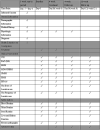A randomized double-blind placebo-controlled multicenter trial of Bushen Yisui and Ziyin Jiangzhuo formula for constipation in Parkinson disease
- PMID: 32664145
- PMCID: PMC7360320
- DOI: 10.1097/MD.0000000000021145
A randomized double-blind placebo-controlled multicenter trial of Bushen Yisui and Ziyin Jiangzhuo formula for constipation in Parkinson disease
Abstract
Introduction: Constipation is a common nonmotor symptom of Parkinson disease (PD). Constipation can also impact patient's quality of life. Chinese herbal medicines have been used for the treatment of constipation in PD. This trial will evaluate the efficacy and safety of a Chinese herbal formula Bushen Yisui and Ziyin Jiangzhuo (BYZJ) for the treatment of constipation in PD.
Methods and analysis: This randomized, double-blind, placebo-controlled, multicenter clinical trial will involve 4 hospitals in Beijing, China. The study will aim to recruit 90 PD patients with constipation between 30 and 80 years-of age with a score of 1 - 4 on the Hoehn and Yahr scale. Once recruited, Patients will be randomized into a BYZJ group or a placebo group in a 2:1 ratio. The trial will include a 1-week run-in period, a 4-week double-blind treatment period, a 4-week and a 12-week follow-up period. All patients will be educated about PD-related constipation during the run-in period. BYZJ granules and simulated granules will be administered twice daily for 4 weeks to the BYZJ group and the placebo group respectively. Assessments will be performed during run-in period, before the start of treatment (baseline, week 0), and at 4, 8, and 16 weeks. The primary outcome will be measured with the Constipation Severity Instrument, and secondary outcomes will be evaluated with the Patient Assessment of Constipation Quality of Life questionnaire, Bristol Stool Form Scale, Movement Disorders-Unified Parkinson Disease Rating Scale, Nonmotor Symptoms Scale, PD Sleep Scale, Parkinson Fatigue Scale-16. Laxative use (dose and frequency) will also be recorded. Intention-to-treat and per-protocol set analyses will be used to compare symptom improvement between the 2 groups. Any adverse events will be recorded.
Discussion: If found effective and safe, BYZJ formula will be one of Chinese herb to treat constipation and even other nonmotor or motor symptoms in PD patients. The results will sustain the broader use of BYZJ formula in PD.
Conflict of interest statement
The authors have no conflicts of interest to disclose.
The authors have read and understood Medicine policy on declaration of interests and declare that we have no conflicts of interest to disclose.
Figures


Similar articles
-
Efficacy and safety of SQJZ herbal mixtures on nonmotor symptoms in Parkinson disease patients: Protocol for a randomized, double-blind, placebo-controlled trial.Medicine (Baltimore). 2017 Dec;96(50):e8824. doi: 10.1097/MD.0000000000008824. Medicine (Baltimore). 2017. PMID: 29390272 Free PMC article. Clinical Trial.
-
Efficacy of MaZiRenWan, a Chinese Herbal Medicine, in Patients With Functional Constipation in a Randomized Controlled Trial.Clin Gastroenterol Hepatol. 2019 Jun;17(7):1303-1310.e18. doi: 10.1016/j.cgh.2018.04.005. Epub 2018 Apr 12. Clin Gastroenterol Hepatol. 2019. PMID: 29654915 Clinical Trial.
-
Chinese herbal medicine (Ma Zi Ren Wan) for functional constipation: study protocol for a prospective, double-blinded, double-dummy, randomized controlled trial.Trials. 2013 Nov 4;14:366. doi: 10.1186/1745-6215-14-366. Trials. 2013. PMID: 24180235 Free PMC article. Clinical Trial.
-
Cochrane Review: Osmotic and stimulant laxatives for the management of childhood constipation (Review).Evid Based Child Health. 2013 Jan;8(1):57-109. doi: 10.1002/ebch.1893. Evid Based Child Health. 2013. PMID: 23878124 Review.
-
Constipation in Parkinson's Disease: A Systematic Review and Meta-Analysis.Eur Neurol. 2023;86(1):34-44. doi: 10.1159/000527513. Epub 2022 Dec 5. Eur Neurol. 2023. PMID: 36470230
Cited by
-
Efficacy and Safety of Traditional Chinese Herbal Medicine for Antipsychotic-Related Constipation: A Systematic Review and Meta-Analysis of Randomized Controlled Trials.Front Psychiatry. 2021 Apr 29;12:610171. doi: 10.3389/fpsyt.2021.610171. eCollection 2021. Front Psychiatry. 2021. PMID: 33995139 Free PMC article.
-
Mucus-Penetrating Alginate-Chitosan Nanoparticles Loaded with Berberine Hydrochloride for Oral Delivery to the Inflammation Site of Ulcerative Colitis.AAPS PharmSciTech. 2022 Jun 27;23(6):179. doi: 10.1208/s12249-022-02327-4. AAPS PharmSciTech. 2022. PMID: 35761150
References
-
- Knudsen K, Krogh K, Østergaard K, et al. Constipation in Parkinson's disease: subjective symptoms, objective markers, and new perspectives. Move Disord 2017;32:94–105. - PubMed
-
- Zhang Y, Lu Z, Dong H, et al. Epidemiological investigation of non-motor symptoms and treatment of Parkinson's disease. Stroke Neurol Dis 2016;23:343.
-
- Liu S, Liu W. An experimental study of Wenyang Jianpi method in treating laxative constipation in rats. J Beijing Univ Tradit Chin Med 2013;36:599–602.
-
- Zhang H, Gu Z, An J, et al. Non-motor symptoms in treated and untreated Chinese patients with early Parkinson's disease. Tohoku J Exp Med 2014;232:129–36. - PubMed
Publication types
MeSH terms
Substances
LinkOut - more resources
Full Text Sources
Medical

